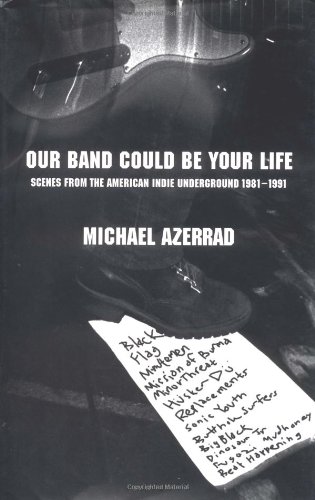Austin Kleon has a recent post over on his excellent Tumblr that got me to thinking lately. The post is really a kind of book review of Michael Azerrad's Our Band Could Be Your Life: Scenes from the American Indie Underground 1981-1991. In particular Kleon commentates on and outlines some quotes from the book such as:
Sonic Youth was especially good at networking — Thurston Moore published a fanzine in which he profiled bands and musicians he wanted to connect with, they would figure out who the hot critics were and go schmooze with them at parties, and they would do everything they could to help out other bands, building up tons of good will. A lot of this was calculated, of course, but it also just was a natural outgrowth of the band members’ interests and curiosities. Here’s Lee Ranaldo:
"We’re all voracious acquirers of information, whether it be books or movies or whatever, we’re just really vastly into what’s going on in culture and trying to synthesize what’s going on. I think that was just a natural impetus, a natural tendency…“A lot of bands are trying to present themselves as a singular entity in the center of it all. And I think we’ve always been the exact opposite, trying to present ourselves amidst a universe or a society of stuff going on.”
This makes me think of running a small theatre company. Being an indie theatre artist in a small theatre group is similar to being a musician in a small indie band. Ranaldo could be referring to how small theatre companies and the artists involved with them interact in the Dallas cultural landscape, and by extension, most large arts-intensive cities.
A community forms because we are all interested in each other as artists. We share interests and passions. In fact, in regards to how we relate with one another, I would argue the people are more important than the work they make in an arts community. After all, a community is people, not the work/products of the people.
A community forms because we are all interested in each other as artists. We share interests and passions. In fact, in regards to how we relate with one another, I would argue the people are more important than the work they make in an arts community. After all, a community is people, not the work/products of the people.
Here's how this works in a cultural landscape like Dallas. First off, there are around 50 or so theatres operating at any given time in the DFW area. Second, theatre-makers make horrible theatre-goers.
But just because we don't see each other's work very often doesn't mean we are out of touch with the community. In fact, it could be argued theatre artists support each other far more than they support each other's work.
That said, Ranaldo's last statement above of "a lot of bands think of themselves as a singular entity in the center of it all..." is a perennial problem in the indie theatre community as well. Usually it is a small group, newly formed, that comes along, trying to stand alone thinking, "We'll do it better..." without really even knowing what has happened before in the area. I think this explains why so many theatre companies start with Beckett or Sarah Kane (or now, Annie Baker).
The other way the singular entity problem shows up is when a the folks at a theatre think they are too big for those around them. They have either lasted longer (rare), had some recent minor success, or feel they are doing something far more important that what others are doing.
No one profits from the Singular Entity mentality.
Kleon's post about the book outlines more quotes that provide additional food-for-thought. I'll address them in upcoming posts.
Kleon's post about the book outlines more quotes that provide additional food-for-thought. I'll address them in upcoming posts.

No comments:
Post a Comment